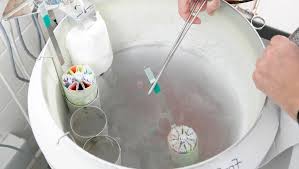The world's first sperm bank for HIV-positive donors has launched in New Zealand, aiming to fight stigma surrounding the illness.
Three HIV-positive men have already signed up to donate - all of whom have an undetectable viral load.
This means virus levels in their blood are so low that HIV cannot be transmitted through sex or childbirth.
Sperm Positive was launched by three charities ahead of World Aids Day on 1 December.
Body Positive, the New Zealand Aids Foundation and Positive Women Inc hope the project will educate the public about transmission of HIV, and reduce stigma for those who have the illness.
The sperm bank says it will make clear that all donors are HIV positive but on successful treatment that prevents them passing on the virus.
While it does not itself operate as a fertility clinic, Sperm Positive will put people in touch with local fertility clinics if they agree to a match.
One of the three donors, Damien Rule-Neal, told Radio New Zealand that after he revealed his illness to his employer, he was bullied and eventually decided to leave his job.
"We've got the science behind it to say that medication makes you untransmittable," he said. "I've seen a lot of my female friends that have HIV go on to have children, it shows that science and medication have given us that ability back."
Diagnosed in 1999, Mr Rule-Neal is healthy and married, with two children and three grandchildren.
There have been a number of advances in HIV treatment in recent years, including a world-first kidney transplant from one HIV-positive patient to another in March.
Antiretroviral therapy - a daily combination of drugs that prevents HIV from replicating in the body - can lower the amount of the virus in the blood to undetectable levels.
But HIV continues to be one of the world's most serious public health challenges. Approximately 38 million people had HIV/AIDS in 2018.
source: BBC



